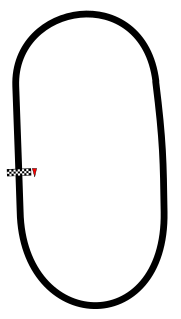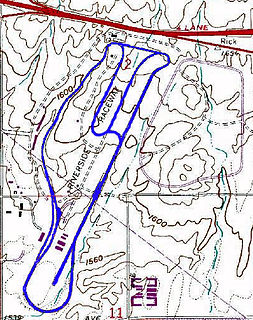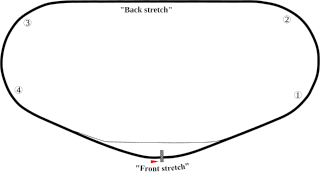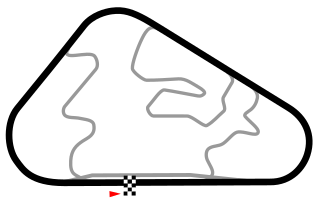Related Research Articles
The 1971 NASCAR Winston Cup Series season began on Sunday February 14 and ended on Sunday November 20. Richard Petty was the champion for this Winston Cup season. After 20 years of being named the NASCAR Grand National Series, R. J. Reynolds first became the primary sponsor in a decade where the growing anti-tobacco movement banned its advertisement on television and motorsports was the ideal place to place their advertisements. Through NASCAR, Winston merchandise was unveiled to live viewers of the races. This kind of merchandise would also be given out at stores that sold cigarettes in subsequent years. Race car drivers were encouraged to smoke cigarettes until the mid-2000s brought in strict drug testing policies in addition to a smoking cessation program by Nicorette, a GlaxoSmithKline brand.
The 1970 NASCAR Grand National Series season began on Sunday January 18 and ended on Sunday November 22. Bobby Isaac was the champion of the series as NASCAR transitioned from the Grand National era to the Winston Cup era. Only one foreigner was racing that year, a Canadian named Frog Fagan. It was also the last NASCAR national touring series season to feature a dirt track race until the 2013 NASCAR Camping World Truck Series.
The 1977 Nashville 420 was a NASCAR Winston Cup Series event that took place on July 16, 1977, at Nashville Speedway in Nashville, Tennessee.
The 1977 Music City USA 420 was a 420-lap race that took place on May 7, 1977, at Fairgrounds Speedway in Nashville, Tennessee.

The 1969 Texas 500 was a NASCAR Grand National Series event that was held on December 7, 1969, at Texas World Speedway in College Station, Texas.
The 1970 Greenville 200 was a NASCAR Grand National Series event that was held on June 27, 1970, at Greenville-Pickens Speedway in Greenville, South Carolina.

The 1976 Volunteer 400 was a NASCAR Winston Cup Series racing event that took place on August 29, 1976, at Bristol International Speedway in Bristol, Tennessee.

The 1977 Old Dominion 500 was a NASCAR Winston Cup Series racing event that took place on September 25, 1977, at the historic Martinsville Speedway; a race track that has enjoyed the presence of NASCAR since its first sanctioned race on July 4, 1948.

The 1973 Gwyn Staley 400 was a NASCAR NASCAR Cup Series racing event that took place at North Wilkesboro Speedway on April 8, 1973, in North Wilkesboro, North Carolina.

The 1973 Dixie 500 was a NASCAR Winston Cup Series racing event that took place on July 22, 1973, at Atlanta International Raceway in Hampton, Georgia.
The 1976 Music City USA 420 was a NASCAR Winston Cup Series race that took place on May 8, 1976, at Nashville Speedway in Nashville, Tennessee.

The 1976 Riverside 400 was a NASCAR Winston Cup Series racing event that took place on June 13, 1976, at Riverside International Raceway in Riverside, California. The California 150 for sportsman cars was run prior to this race. The winner was Ivan Baldwin followed by Dan Clark and Jim Sanderson.
The 1970 Home State 200 was a NASCAR Grand National Series event that was held on September 30, 1970, at North Carolina State Fairgrounds in Raleigh, North Carolina.

The 1979 Winston Western 500 was a NASCAR Winston Cup Series racing event that took place on January 14, 1979, at Riverside International Raceway in Riverside, California. Buying a souvenir program at this race was relatively inexpensive for the era at $2 USD per copy.

The 1973 Medal of Honor Firecracker 400 was a NASCAR Winston Cup Series race that took place on July 4, 1973, at Daytona International Speedway in Daytona Beach, Florida.

The 1975 Winston Western 500 was a NASCAR Winston Cup Series racing event that took place on January 19, 1975, at Riverside International Raceway in Riverside, California. A companion race known as the Permatex 200, in the Late Model Sportsmen Series, would be held one day prior to this event on the same track.

The 1974 Southeastern 500 was a NASCAR Winston Cup Series racing event that was held on March 17, 1974, at Bristol International Speedway in Bristol, Tennessee.

The 1977 Champion Spark Plug 400 was a NASCAR Winston Cup Series racing event that took place on August 22, 1977, at Michigan International Speedway in Brooklyn, Michigan.

The 1983 Like Cola 500, the 10th running of the event, was a NASCAR Winston Cup Series racing event held on July 24, 1983, at Pocono International Raceway in Long Pond, Pennsylvania.

The 1972 American 500 was a NASCAR Winston Cup Series racing event held on October 22, 1972, at North Carolina Motor Speedway in Rockingham, North Carolina. While not televised, the 1972 American 500 was covered by local radio stations WAYN-AM and WEEB-AM.
References
- ↑ "1970 Tidewater 300 weather information". The Old Farmers' Almanac. Retrieved 2012-07-23.
- 1 2 3 4 5 6 7 8 9 10 11 12 "1970 Tidewater 300 information". Racing Reference. Retrieved 2009-10-21.
- ↑ USARacing Pro Cup Media Guide August 22, 2009, edition
- ↑ Retirements and one-time appearances at Race Database
- ↑ "1970 Tidewater 300 crew chief information". Racing Reference. Retrieved 2018-07-30.
| Preceded by 1970 American 500 | NASCAR Grand National/Winston Cup Races 1970-71 | Succeeded by 1971 Motor Trend 500 |
| Preceded by 1969 Texas 500 | NASCAR season-ending races 1949-present | Succeeded by 1971 Texas 500 |